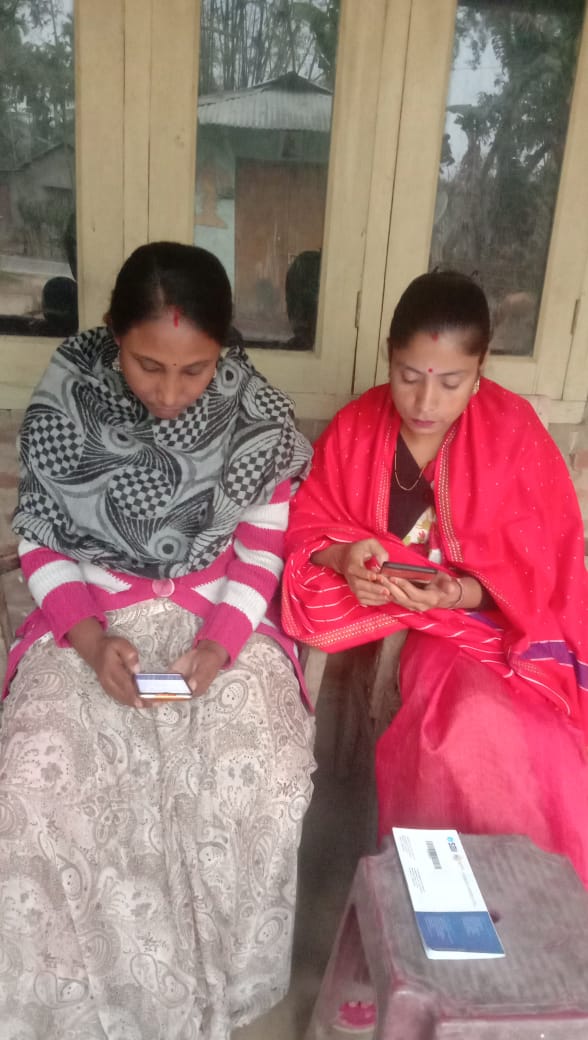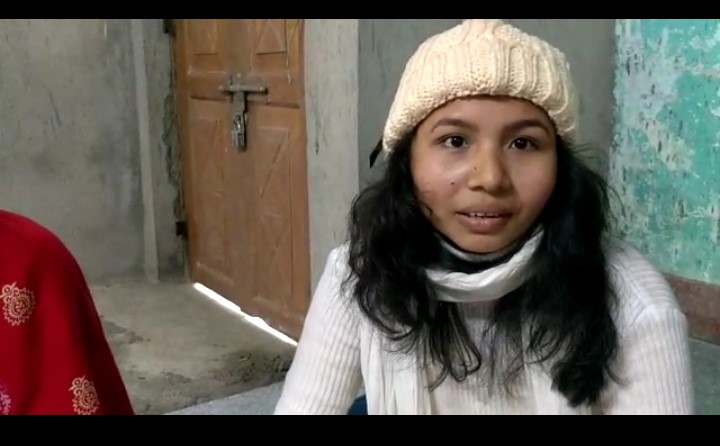The story of one’s first period can be both an intimidating one and an intimate one. Sana Afreen narrates her three day visit to the North-Eastern village of Nagaon where she spent much cherished time with Digital Didis as they included her in their circle sharing stories and talking about menstrual cycle.

“The trip to Assam was one of a kind and also it was my first visit to the state of simplicity, as I would like to call it. But, ‘simplicity’ would be hard to justify if we were to compare the most popular North-Eastern city, Guwahati, with the cultural capital Nagaon.
The kinds of food I ate in the state were very different from what I had experienced before. The people in the villages of Nagaon district seemed close to nature. Passing by the villages, our vehicle went through roads whose beauty was ecstatic. These villages seemed very different from the ones I visited elsewhere.
The plantations stretched across were covered with trees like palm, dates, commercial woods, bamboos, bananas and many more. The houses were made of mosaic amidst the plantation. Most of the houses were kachcha, made out of mud, and the roofs were sloppy, made from tin.
The people there are closely associated with their culture. As we visited the states right after the festival of Bihu, the residents welcomed us with their traditional gamchha, which is symbolic of their affinity and love towards their guests. It is the highest honour that they can bestow upon a visitor.
Although the visit was an official one, I felt very welcomed. The first day of the visit was challenging as my visit companion struggled with motion sickness on our way to Nagaon from Guwahati post meeting the regional team. On the second day we met Naim Ahmed. Meeting this fresh graduate at his house made me understand the kind of work our organisation was doing. He was looking for a job and works as a SoochnaPreneur with the help of the computer provided by Digital Empowerment Foundation. He has also been given WiFi access under the PM-WANI project. I noticed many people visiting his place for digital services like online payment, updating KYC of the bank account, etc. His house was located in a pretty spot with a garden outside, which is a common thing in most houses around, where he was about to organise the closing of the program PM-WANI linked to a nearby school.
We visited the house of another SoochnaPreneur, Mintu Mani Saikai, situated very close to a beautiful lotus pond. Meeting Mintu was such a pleasure as I had never seen someone so happy and satisfied with whatever little they were occupied with in life. Their enthusiasm engraved in me a more positive perspective towards the work that I have started doing. They were so happy with our visit that it could not be camouflaged even if they tried. I am not very sure about how much they were able to rely on the assets that were provided to them but they seemed absolutely sure that they were satisfied with the life he was living. They were excited to show us the traditional art work done by them and we were fortunate enough to be gifted gamchas. I am addressing Mintu in gender neutral terms as I could not strike a conversation to figure out their gender preference as it was much more important for me to gel into the conversation. I am hoping to see more energy and initiatives from them as they have been chosen as a Digital Didi, a program identifying, training and releasing a cadre of women working as health SoochnaPreneurs in the community to work with women and girls on sensitive yet crucial topics.

From there we reluctantly left to see another Digital Didi, Baby Bora. She was a very energetic woman, juggling different roles simultaneously and made sure to expose us to her busy world while offering us a wholesome authentic Assamese lunch. Apart from being a SoochanPreneur, she manages the micro dairy at her home. At the centre, the milk which is collected from that village and the nearby ones gets tested for its quality, stored and then packed to be delivered to the company whose franchise she runs. Her entrepreneurial identity is reflected in her role as a SoochnaPreneur as people often keep visiting to get digital services.
The third day was planned for training with the Digital Didis. All the enrolled Digital Didi’s except one participated in the training and we got to hear many interesting stories from the participants. The stories of their first menstrual period (Menarche), feelings of fear after having it for the first time, moments of anticipation, stories that spoke differently compared to the major part of the country, especially the Hindi belt, caught my attention. The story of the menstrual cycle, the root cause for the existence of humanity, never ceases to be an eye-opening one for someone like me who is set out to present detailed discourse on the topic, but is very sheepish when asked to do the same at her house. I got to know the cultural pretext to the first period which is celebrated as a ‘second marriage’ or a ‘small wedding’ with the entire village and the relatives as the guests. A feast is prepared for every guest. It is like welcoming the maturity and fertility of girls. It is called ‘Tuloni Biya’, and is celebrated keeping alive the spirit of annual festival ‘Ambuvachi Mela’, where the Goddess of Kamakhya is worshipped and celebrated.

Of the eleven stories that I heard, three of them stayed with me very closely. One of them was shared by Rupali Ketaki Sharma who like everyone else was excited to celebrate her first period as a ‘second marriage’. But, because her uncle had died just a few days before she got her first period, the celebration could not happen. Because of this she feels a little uncelebrated to this day. At her place, it is a ritual that during periods girls would not be provided with sanitary pads or cloth to control the blood flow, but would rather be made to rest on a paddy husk bed.
On asking Surbhi Doloi how she felt during her first period, we heard her sharing that she was nervous but excited as the event is celebrated on a grand scale. She dreamily said that she was gifted new dresses, jewellery, and was pampered with application of turmeric, oil, etc. She also highlighted how all of her favourite dishes like pulao, biryani and many sweets were made. She was dolled-up in an attire of her liking. Though it was a little painful due to her period cramps, the celebration compensated for all of it.

Mintu Mani Saikia’s story was about a second-hand experience. The ‘second-marriage’ of their sister is what introduced the phenomenon of menstrual cycle. For them the experience has been such that they are unaware of the feelings that entails menstrual bleeding. The problems, the beauty, the uniqueness of process, the cramps, the awareness of growing up to be a woman, the categorisation as a woman, the self-understanding of growing up to become a mother, are some of the feelings that he/she is unaware of. But, despite all of this, the enthusiasm and willingness to work on the topic was an all-new experience for myself.
Then we trailed our training to the ‘Highlight of the Topic’ to assess their different perception on the pure-impure status of the menstrual blood. Some said that they have been taught to believe that the menstrual blood is impure. This is what they have heard, and never thought of asking about it otherwise. This highlighted the general perception as the views were divided with six women saying that the menstrual blood is impure, and three saying it is not.
The one-day training with these beautiful women, stocked me up with liveliness. The training session, given the importance of the topic and the need to overcome the shortcomings that have been unnecessarily associated, was highlighted by the state media. We all had lunch together which was cooked by one of the Digital Didis with the help and full cooperation of her husband. This was the three day journey with these wonderful women in a beautiful yet simple village of Nagaon.”
The stories are shared so that discussions around menstruation are not tagged as taboo as it is a very important part of a woman’s life. The Digital Didi program is aiming to sensitise rural society to open up about their experiences with the hope that the awareness about menstrual hygiene reaches every household eventually. The SoochnaPreneurs are trained to inform women from their villages about the hygiene that is required to be maintained in order to avoid infections that a woman is easily susceptible to during menstruation. Digital means have helped to do this on a larger scale and have better reach as digital media can help spread the information about the sensitive topic in a much more efficient and effective way without making someone feel uncomfortable about it.










